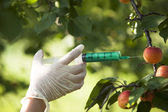The move to bio pesticides has been to a great extent driven
by customer demand for without pesticide foods and low residues, changes in
natural and food security regulations, and the requirement for more profitable
and supportable farming practices.
The Barriers and Challenges to Bio pesticide
 |
| Bio Pesticide |
Bio pesticides are highly focused to particular types of pests, so farmers need to have diverse products to control various species. Additionally they are not a fast-kill option: they suppress pest populations through natural means instead of killing on contact. Bio active items also have a tendency to have a shorter shelf life and diminish quickly in sunlight. Since they don't continue in the atmosphere, they must be timed simply right to give powerful pest control. Expansive range, dependable, quick-kill agrochemicals offer a speedier, surer course to pest disposal.
To utilize bio pesticides successfully, producers need to know an extraordinary arrangement about the life-cycle of the pest or pathogen they are attempting to control and understand the timing and proper conditions for application of the item. More training is required in the agricultural group to help producers usual to expansive range agrochemicals begin to incorporate bio pesticides.
Bio pesticides offer various advantages for farmers and customer:
- Durability: Large retailers and food organizations are attempting to meet durability objectives—and looking down the inventory network for help. Suppliers utilizing bio pesticides are being looked for as key accomplices to help organizations meet their objectives.
- Improvement in prices and timelines: Bio pesticides normally cost one tenth of that and can come to market in a little as three to four years. It is a great extent because expensive long term toxicology, natural destiny and residue information are regularly not needed subsequent to the microbial or plant extracts are already ordinarily found in the atmosphere.
- Elasticity: Bio pesticides have less crop restrictions than ordinary pesticides. This implies that producers can have a shorter pre-harvest interim for field re-entry, permitting for more labor and harvest flexibility.
- Resistance management: Pest resistance to traditional agrochemicals is a developing issue for farmers. Bio pesticides give extra, more complicated modes of activity to manage resistance. Powerful bug resistance management methods are important to protect existing synthetic chemical product portfolios to develop the life cycle of these items.
An Integrated perspective to
Crop Protection
Within the previous years, the industry has seen bio pesticide differently. They are presently being seen as a necessary piece of the crop protection industry. At the point when utilized as a feature of an integrated pest management (IPM) program, bioactive crop protection items can extraordinarily decrease the utilization of traditional pesticides and offer diverse methods of activity to manage resistance.
No comments:
Post a Comment